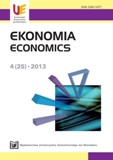Ekonomia behawioralna: od koncepcji racjonalności do wizji ustroju ekonomicznego
Behavioral economics: from a concept of rationality to a vision of an economic system
Author(s): Janina Godłów-LegiędźSubject(s): Economy
Published by: Wydawnictwo Uniwersytetu Ekonomicznego we Wrocławiu
Keywords: behavioral economics; rationality; neoclassical economics; institutionalism
Summary/Abstract: The purpose of this article is to show the diversity in behavioral economics from both a normative and an explanatory point of view. Based on a critical analysis of the literature, the author presents behavioral economics from three perspectives: the perspective of diversification of the ideas about the way of functioning of human mind and normative suggestions concerning rationality, the perspective of connections between views on rationality and on the optimal economic system, and the perspective of the relationship between a psychological and institutional approach in economics. The analysis leads to the conclusion that in behavioral economics, we can find two opposite approaches to rationality, which result in different assessments of both individual behavior as well as the functioning of social institutions. The ”old” school of behavioral economics, which developed the concept of ecological rationality, is closely related to the institutional approach. The ”new” behavioral economics is less critical of neoclassical economics. It is a consequence of their tendency to interpret rationality in a constructivist spirit. But it is worth emphasizing the important common feature connecting both schools of behavioral economics with institutional economics. Institutionalism and the old school of behavioral economics emphasize the role of institutions from the cognitive, normative, and regulatory perspectives. The new behavioral economics adopts a normative conception of rationality close to that of neoclassical economics, but strongly accentuates the contextual character of human knowledge and behavior, i.e. one of the fundamental principles of the Kahneman school is framing decisions. There is an analogy between how social institutions on the one hand, and the formulation of the problem on the other affect the decisions of the individual. An architecture of choice is created as a result of the activities of private entities and governments. The advocates of libertarian paternalism are conscious of the threat stemming from the fact that cognitive deficiencies affect not only individuals as private entities, but also individuals as regulators and experts, hence their caution with respect to regulatory solutions. Behavioral economics as well as institutional economics both show various aspects and the complexity of the problem of coordination and regulation in a social system. The development of these two streams of economic thought reflects a return to a more balanced approach, both with respect to the assumptions of economic theory as well as with respect to reaching political conclusions based on economic theory.
Journal: Ekonomia
- Issue Year: 2013
- Issue No: 25
- Page Range: 24-41
- Page Count: 18
- Language: Polish

